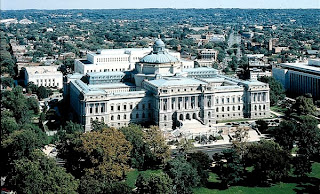Here's an interesting
moment in music!
moment in music!
THE MOMENT
The Universal Music Group has donated
over 200,000 master recordings
to the Library of Congress.
Coming in at more than 5,000 linear feet of shelf space (over a mile), it includes metal and lacquer discs, as well as master mono tapes of released and unreleased versions of recordings by an amazing collection of American artists, including Louis Armstrong, Bing Crosby, Tommy Dorsey, Billie Holiday, the Andrews Sisters, Connee Boswell, Jimmy Dorsey, the Mills Brothers, Guy Lombardo, Ella Fitzgerald, Fred Waring, Judy Garland, and Dinah Washington, among others.
Among the tracks are songs like Louis Armstrong singing "Ain’t Misbehavin’", the Mills Brothers’ doing "Paper Doll", Les Paul’s "Guitar Boogie"
and der Bingles 1947 version of "White Christmas".
THE PLAYERS
The Universal Music Group is a unit
of Vivendi, a global media and communications company. UMG owns the most extensive catalog
of music in the industry, which includes the last 100 years of the world's most popular artists
and their recordings.
It is the world’s largest music company,
responsible for roughly 29 percent
of album sales in the U.S. alone.
responsible for roughly 29 percent
of album sales in the U.S. alone.
Among their current sub-contractors are musicians like U2, Amy Winehouse, Lady Gaga, Taylor Swift, Black Eyed Peas, Rihanna, Eminem and Lil Wayne.
The Library of Congress is the oldest
federal cultural institution in the United States.
It currently has more than 3 million sound recordings in its collections.
WHY IS THIS A GOOD THING?
I'm glad that this has happened. This music is important. It should be preserved, and in the best possible ways, so that people who are interested can find it, and hear it.
> The fact that the Library of Congress will archive this collection. and care for this music, and make it available - albeit in a very limited form - is a good thing.
It's a subject close to my heart, every since I learned that in Canada, our musical heritage is being left to rot. An awful situation, which at one point, I even tried to interest other people in: The Old Weird Canada.
It's a subject close to my heart, every since I learned that in Canada, our musical heritage is being left to rot. An awful situation, which at one point, I even tried to interest other people in: The Old Weird Canada.
Whatever.
> This action by Universal may inspire other corporations who own priceless collections of master recordings to also pass them along to the Library of Congress. With this precedent, and what should be a boilerplate template in place, it should be easy for other corporations to do the same thing.
Indeed, they may have a real incentive to do so.
Indeed, they may have a real incentive to do so.
> However imperfect the understanding under which the Library receive these treasures, the fact that they will be preserved and be available to listeners is a good thing in the world.
WHAT RESERVATIONS COULD YOU
POSSIBLY HAVE ABOUT THIS?
POSSIBLY HAVE ABOUT THIS?
i'm so glad you asked.
like all good press releases, this one leaves
a few things out:
a few things out:
like this...
Under the agreement negotiated during discussions that began two years ago the Library
of Congress has been granted ownership of the physical discs and plans to preserve and digitize them. But Universal, a subsidiary of the French media conglomerate Vivendi that was formerly known as the Music Corporation of America, or MCA, retains both the copyright to the music recorded on the discs and the right to commercialize that music after it has been digitized.
and this...
The collection bequeathed to the Library of Congress does not, however, include recordings from the vaults of some of the important blues and soul labels that MCA acquired on its way to becoming the largest of the “big four” record companies. For example master recordings of both Chess Records (and its subsidiary Checker, Cadet and Aristocrat labels) and Motown Records (and its Tamla and Gordy subsidiaries) are excluded from the agreement, at least initially.
and this...
The exact monetary value of the collection is not known, and a formal assessment has not yet been made. But in addition to the savings that will be gained from no longer having to store the discs, Universal could be in line for a substantial tax write-off as a result of the donation.
***
like any good press release, this one conjures more questions than it answers.
? what are the costs of digitizing/archiving this collection?
? what cost sharing arrangements are in place vis-a-vis the commercialization of these archives post-digitalization? can the Library of Congress recoup expenses?
NOTE ALSO:
The Library will be able to stream these tracks from a website it is constructing for that purpose so people will be able to hear them... which is important, because as the press release notes:
"only an estimated 14 percent of pre-1965 commercially released recordings were currently available from rights holders. The study also found that of the music released in the U.S. in the 1930s, only about 10 percent of it could be readily accessed by the public."
Is it reasonable to bitch people out for downloading music that the Industry is not making available?
and if I had nothing but time, and/or was getting paid to do this thinking, the question i would put on the final would be:
"how does this agreement differ from the agreement between the Smithsonian Institute and Folkways Records? Discuss.
this and a number of other ugly truths can be found at the original source of this article on the New York Times
the source
the source of the source
the source of the source
- 30 -
.
.















No comments:
Post a Comment